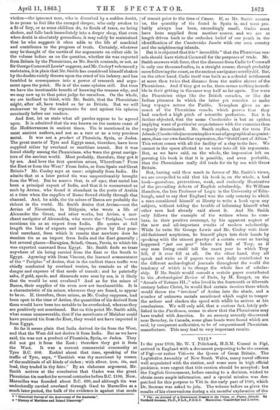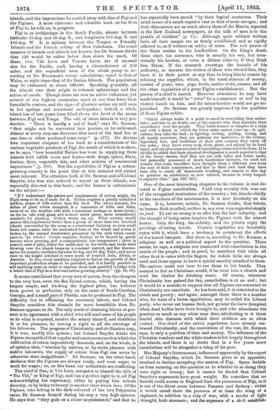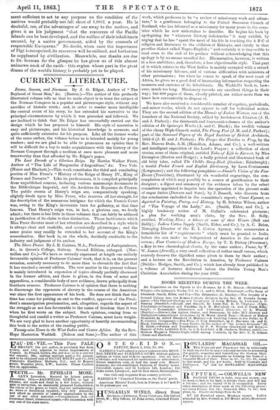VITI.* IN the year 1859, Mr. W. T. Pritchard, H.B.M.
Consul in Fie, arrived in England with a document purporting to be the cession of Figi—or rather Viti—to the Queen of Great Britain. The Legislative Assembly of New South Wales, many naval officers well acquainted with the station, and some men in high official positions, were urgent that this cession should be accepted ; but the English Government, before coming to a decision, wished to obtain more ample information, and a special mission was des- patched for this purpose to Viti in the early part of 1860, which Dr. Seeman was asked to join. The volume before us gives the results of his observations during a six months exploration of the
• Viii an Account of a Government Mission to the Vlach, or Fivian, Islands. By
Berthold Beeman, PhD., F.L.S., Maeonllian: Cambridge sod London.
islands, and the impressions he carried away with him of Figi and the Figians. A more elaborate and scientific work on the flora of Figi is, he tells us, in progress.
Figi is an archipelago in the South Pacific, situate between latitudes 15 deg. and 20 deg. S., and longitudes 176 deg. E. and 180 deg. W. It is midway between the Tongan or Friendly Islands and the French colony of New Caledonia. The exact number of islands and islets is not known, but Dr. Seeman thinks that 230 would be rather below than above the mark, Of these, two, Viti Levu and Vanua Levu, are of unusual -size for the Pacific, each having a circumference of 250 miles, and the superficial area of the whole group is, ac- cording to Dr. Peterman's recent calculations, equal to that of Wales, or eight times that of the Ionian Islands. The population may be estimated at about 200,000. Speaking generally, all the islands owe their origin to volcanic upheavings and the action of corals. Though there are now no active volcanoes, yet several of the highest mountains must at one time have been formidable craters, and the signs of plutonic action are still seen in hot springs and occasional earthquakes ; indeed, a whole island has of late years been lifted above the level of the ocean between Figi and Tonga. The soil of these islands is very pro- ductive. "There is hardly a rod of land," says Dr. Seeman, "that might not be converted into pasture, or be cultivated. Almost at every step one discovers that most of the land has at one time or other produced some crop." (p. 277). He devotes two important chapters of his book to a consideration of the various vegetable products of Figi, the result of which is to show, as he says, "how bountiful Nature has been in supplying these islands with edible roots and fruits—with drugs, spices, fibres, timber, dyes, vegetable fats, and other articles of commercial importance " (p. 380). But the capabilities of Figi as a cotton- growing country is the point that at this moment will attract most interest. The attention both of Dr. Seeman and of Colonel Smythe, who was also ordered to report on these islands, was especially directed to this head ; and the former is enthusiastic on the subject :— "If I understand the nature and requirements of cotton aright, the Figis seem to be as if made for it. Cotton requires a greatly undulated surface, slopes of hills rather than flat land. The whole country, the deltas of great rivers excepted, is a succession of hills and dales, covered on the weather side with a luxurious herbage or dense forest ; on the lee side with grass and isolated screw pines, more immediately available for planting. Cotton wants sea air. What country would answer this requirement better than a group of more than two hundred islands surrounded by the ocean as a convenient highway to even small boats and canoes, since the unchecked force of the winds and waves is broken by the natural breakwater presented by the reefs which nearly encircle the whole ? Cotton requires, further, to be farmed by gentle breezes when growing, and a comparatively low temperature ; there is scarcely ever a calm, either the south-east or the north-east trade.wind blowing over the islands keeps up a constant current, and the thermo- meter for months vacillates between 60 deg. and 80 deg. Fehr., and never rises to the height attained in some parts of tropical Asia, Africa, or America. In fine, every condition required to favour the growth of this important production seems to be provided, and it is hardly possible to add anything more in order to impress those best qualified tojudge with a better idea of Figi as a first-rate cotton-growing country." (pp. 48, 49).
It seems established that every sort of cotton, from the cheapest to the very best, even the Sea Island cotton, which, having the largest staple, and fetching the highest price, has hitherto been grown in perfection only on the coast of South Carolina, Georgia, and a small.part of Florida, can be produced in Figi. The difficulty lies in obtaining the necessary labour, and Colonel Smythe considers this obstacle far more formidable than Dr. Seeman appears to do. The only mode of obtaining labour at pre- sent is by agreement with a chief, who will send some of his people to do what is required, receive the money himself, and distribute it at his pleasure, he having a right to all the earnings of his followers. The progress of Christianity and civilization may, it is true, modify this system ; but Colonel Smythe thinks the Figians incapable of that regular and continuous exertion which the cultivation of cotton imperatively demands, and, on the whole, is of opinion that, "whether by natives, or by white planters with native labourers, the supply of cotton from Figi can never be otherwise than insignificant." Dr. Seeman, on the other hand, declares that the Figians are always ready, and even eager, to work for wages ; so, on this head, our authorities are conflicting.
The chief of Bau, in Viti Levu, arrogates to himself the title of " Tiu Viti," or King of Figi, and has a perfect right to it, all Figi acknowledging his supremacy, either by paying him tribute directly, or by being tributary to another state which does. Of the Figians, who belong to the dark-coloured of the two Polynesian races, Dr. Seeman formed during his stay a very high opinion. He says that "they gain on a closer acquaintance," and that he
has repeatedly been struck "by their logical acuteness. Their mind seems of a much superior cast to that of most savages ; and their discussions are as much above those of the Maoris, reported
in the New Zealand newspapers, as the talk of men is to the prattle of children" (p. 72). Although quite without written laws, all their usages are as firmly established, and as rigidly adhered to, as if written on tables of stone. The real power of the State resides in the landholders. On the King's death these elect his successor, who is usually his son, but occa- sionally his brother, or even a distant relat've, if they think him fittest. If the monarch oversteps the bounds of his authority, or thwarts the wishes of those who elected him, they have it in their power at any time to bring him to reason by refusing the supplies, which, in the total absence of money, consist of yams, taro, pigs, fowls, native cloth, canoes, and all the other requisities of a great Figian establishment. But the person of a chief is sacred. However obnoxious he may have made himself, it would be "taboo" for a commoner or serf to lay violent hands on him, and the taboo-breaker would not go un- punished. Dr. Seeman was greatly impressed by the qualities
of these Figian nobles.
"Chiefs always make it a point to excel in everything they under- take; and this is, no doubt, one of the reasons why they maintain their ascendancy over the people. They build houses or temples in a style and with a finish to which the lower order cannot come up ; in agri- culture they take the lead ; in fighting, rowing, pulling,. racing, and all manly exercises, they are patterns for imitation ; m the history, legendary lore, and traditions of their own country they carry off the palm ; they know every rock, river, plant, and animal by its local name, and can give some account of exerything connectedwith them. U to all this be added that their physical development is much superior to that of the lower classes, that they are not only taller and better made, but generally possessed of much handsomer features, we need not wonder that some travellers have thought them a different race from the rest of their cormbyuten, and that in their own land they have been able to resist all democratic levelling, and remain to this day as genuine an aristocracy as ever existed, because in every respect a superior class." (pp. 186, 187).
One of the most interesting chapters in the volume is that de. voted to Figian cannibalism. Until very recently this was one of the recognized institutions of the country ; but, thanks chiefly to the exertions of the missionaries, it is now decidedly on the wane. It is, however, certain, Dr. Seeman thinks, that bokola,
as human flesh is called, neither is, nor ever was, regarded simply as food. To eat an enemy is to offer him the last indignity, and the thought of being eaten inspires the Figians with the utmost horror. Only the king, the nobility, and the priests enjoy the privilege of' eating bola-01a. Certain vegetables are invariably eaten with it, which have a tendency to counteract the effects of the horrid banquet. But there is, accordiug to Dr. Seeman, a religious as well as a political aspect to the question. There seems, he says, a religious awe connected with cannibalism in the minds of the people ; and in proof, he mentions that while all other food is eaten with the fingers, for bokola forks are always
used, and these appear to have a special sanctity attached to them.
The natives could not bear to see them in his bands. They seemed to feel as Christians would, if he went into a church and used the chalice for drinking water. Of course, wherever
Christianity has gained the day, cannibalism is at an end ; but it would be a mistake to suppose that all Figians not converted to Christianity are cannibals. As has been said, it is restricted to the chiefs and gentry ; and again, amongst these there is a number who, for want of a better appellation, may be called the Liberal party, who never eat human flesh, nor go near the bares (temples) when dead bodies have been brought in, and who abominate the practice as much as any white man does, attributing to it those fearful skin diseases with which their children are BO often visited. One-third of the entire population have already em- braced Christianity, and the conversion of the rest, Dr. Seeman says, is only a question of time and money. The influence of the Christian teachers and the white traders is felt largely throughout the islands, and there is no doubt that in a few years more cannibalism will be altogether a thing of the past.
Her Majesty's Government, influenced apparently by the report of Colonel Smythe, which Dr. Seeman gives in an appendix, resolved to decline accepting the cession of Figi. Space forbids us from entering on the question as to whether in so doing they were right or wrong ; but it cannot be denied that Colonel Smythe's arguments have great weight. He considers that no benefit could accrue to England from the possession of Figi, as it is out of the direct route between Panama and Sydney ; whilst it would entail there the presence of at least the wing of a regiment, in addition to a ship of war, with a tender of light draught, both steamers ; and the expenses of a civil establish-
ment sufficient to act to any purpose on the condition of the natives would probably not fall short of 7,0001. a year. He is doubtful, too, of the advantages of our sway to the natives, and gives it as his judgment "that the resources of the Pacific Islands can be best developed, and the welfare of their inhabitants secured, by a native government, aided by the counsels of respectable Europeans." No doubt, when once the importance of Figi is recognized, its resources will be utilized, and barbarism be supplanted by civilization. Meanwhile, our thanks are due to Dr. Seeman for the glimpse he has given us of this almost unknown nook of the earth - this region whose part in the great drama of the world's history, is probably yet to be played.
































 Previous page
Previous page